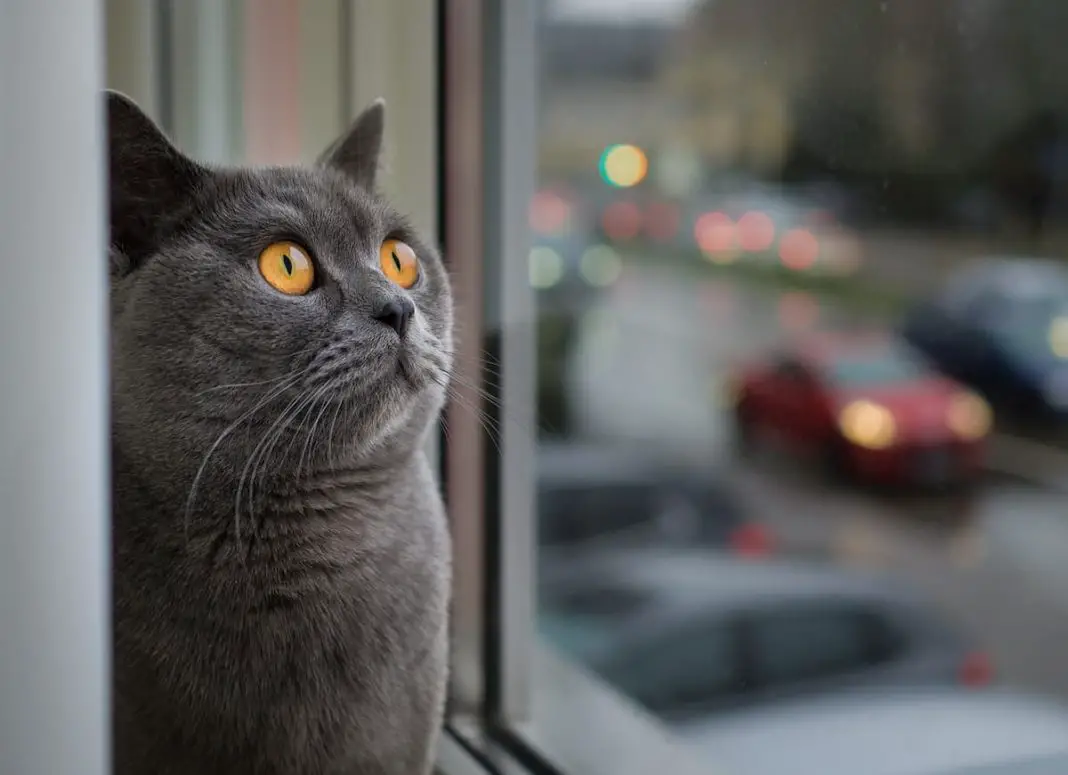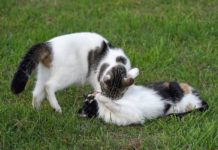Contents
- Cat Making Clicking Noise With Mouth?
- The Reason For Cat Clicking
- Is Cat Clicking Supposed To Mimic Birds?
- How Should You React When Your Cat Clicks?
- What Are The Origins Of Cat Clicking?
Cat Making Clicking Noise With Mouth?
Have you ever noticed your cat making a strange clicking noise while they’re sitting next to the window watching a bird or squirrel? While this behavior may seem odd to some cat owners, cats can use many different sounds to communicate, and the cat clicking noise is a common vocalization in reaction to something they can’t access. This vocal behavior is likely learned during their kitten years when the mother cat will use the sound to encourage her babies to follow her. Cat clicking is also used to express frustration or gain attention.
Other than meowing, cats have many modes of vocal communication, such as clicking and purring. When a cat vocalises, it not only tells us what they want, it also communities how they feel besides using their body to express themselves. Although a vocal cat that’s making a clicking or chattering with their throat is usually nothing to worry about, a cat that’s making a clicking noise that’s coming from a cat’s lung and paired with lethargy or discomfort could be a cause for concern.
The Reason For Cat Clicking
All vocalizations have meaning behind them, but a common cat sound that’s still a bit mysterious to humans is the throat clicking. Although scientists don’t know the exact reasons for a cat making the clicking noise, it likely has something to do with a cat being either excited or annoyed. While it may seem like your cat is trying to imitate the sound of a squirrel or bird when they’re making this clicking and chirping noise, experts believe this not to be the case. Experts believe that cats make the clicking noise out of frustration when they’re unable to reach the animals they see outdoors.
If the clicking sound you hear your cat and it sounds more like rattling from the lungs than a sound from the throat, it can be a sign that there’s fluid in the lungs. This could be because of an infection, like chronic bronchitis, or another serious condition. If you believe your cat is in distress or making a concerning sound, contact your veterinarian for advice.
Is Cat Clicking Supposed To Mimic Birds?
Although cat clicking definitely is a similar sound to that of a bird, however, it isn’t meant to mimic the sound of the cat’s feathered foes. Experts know this because cats will also happily chirp away at squirrels and other potential meals. Sometimes a cat will also bring the clicking behavior into the house. You could also hear this sound during play sessions with cat toys.
How Should You React When Your Cat Clicks?
So, how should you react when your cat makes a clicking noise? Well, first, don’t worry: There’s nothing medically wrong with your cat. If they’re indoor and at the window engaging in some enthusiastic clicking, you could obviously join in with your cat’s excitement, while also sympathizing with their frustration.
Communicating With Sound
From purrs and meows to screams and yowls, cats can make a lot of sounds. Vocalizations are a big way for cats to communicate with one another and with their owners. Meows are probably the most common noise that a cat will make, and depending on the length and tone, it could mean anything from a simple greeting to the cat announcing that their food bowl is empty.
Aside from meows and chirps, a cat will make many other noises as a way to convey a point. Purring is commonly considered being a sign that the cat is content, and while this can be true, sometimes, cats may use it to bring themselves a sense of comfort when they’re nervous. Hissing is a common way of telling someone to step away when a cat is feeling afraid or threatened. Knowing all these unique sounds that a cat can make could help you better respond to and care for your cat’s needs.
How Cats Use Body Language
In addition to having more than 60 different vocalizations, cats also use quite a lot of body language. For example, when your cat closes their eyes slowly while looking at you, it is seen as an expression of love. Cats bumping their head, cuddling, and kneading are other ways a cat will show affection to both other cats and humans. A cat with a tail that’s pointing straight up or slightly curled on top is feeling social.
A cat with its ears down or a puffy tail indicates anger and probably wants to be left alone. If your cat rolls onto their back to show you their belly, then they are letting you know that they feel safe and comfortable around you, although this doesn’t necessarily mean that they want you to pet them. Most cats are protective of that area and normally prefer belly rubs.
What Are The Origins Of Cat Clicking?
It’s believed that the origins of cat clicking come from kittenhood. One assumption is that cat chirping is a way for a mother to corral her litter of kittens to follow her. It’s also believed that cat clicking is be used in return by a kitten as an ear-catching way to get their mother’s attention.
Fittingly, cat clicking is beguiling — and, let’s be honest, pretty darn amusing. So, think of it like the whines of a kid in a candy store trying to convince their parents to stump up for the sugary stuff.
Looking out the window can be both a game and a show in itself for your cat, but it’s important to interact with your cat and to find other ways to keep your cat active and entertained regardless of their age. There’re toys you can play with together imitating the feelings your cat would get when seeing a mouse or bird. No need to think big, anything from catnip-filled toys to games and wand toys that you can both play together.
Providing your cat with ways to get up high will also help to keep them active and content and will feed help to feed their natural instinct to climb. Consider adding a cat tree or cat shelving on a wall so your cat has new areas to explore and different views to experience. Having the ability to jump and scale the tree will entertain your cat while helping them strengthen their muscles.








